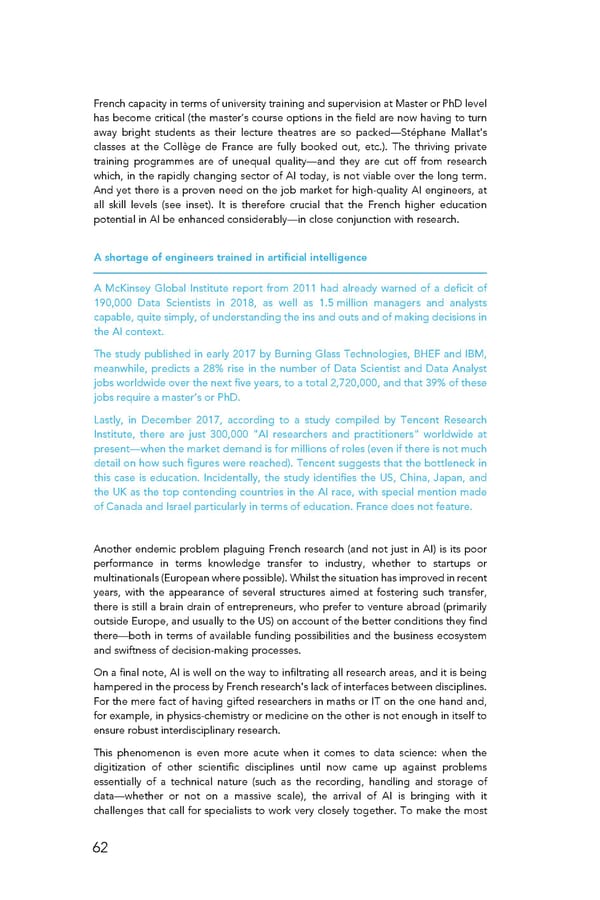French capacity in terms of university training and supervision at Master or PhD level has become critical (the master’s course options in the field are now having to turn away bright students as their lecture theatres are so packed—Stéphane Mallat's classes at the Collège de France are fully booked out, etc.). The thriving private training programmes are of unequal quality—and they are cut off from research which, in the rapidly changing sector of AI today, is not viable over the long term. And yet there is a proven need on the job market for high-quality AI engineers, at all skill levels (see inset). It is therefore crucial that the French higher education potential in AI be enhanced considerably—in close conjunction with research. A shortage of engineers trained in artificial intelligence A McKinsey Global Institute report from 2011 had already warned of a deficit of 190,000 Data Scientists in 2018, as well as 1.5 million managers and analysts capable, quite simply, of understanding the ins and outs and of making decisions in the AI context. The study published in early 2017 by Burning Glass Technologies, BHEF and IBM, meanwhile, predicts a 28% rise in the number of Data Scientist and Data Analyst jobs worldwide over the next five years, to a total 2,720,000, and that 39% of these jobs require a master’s or PhD. Lastly, in December 2017, according to a study compiled by Tencent Research Institute, there are just 300,000 "AI researchers and practitioners" worldwide at present—when the market demand is for millions of roles (even if there is not much detail on how such figures were reached). Tencent suggests that the bottleneck in this case is education. Incidentally, the study identifies the US, China, Japan, and the UK as the top contending countries in the AI race, with special mention made of Canada and Israel particularly in terms of education. France does not feature. Another endemic problem plaguing French research (and not just in AI) is its poor performance in terms knowledge transfer to industry, whether to startups or multinationals (European where possible). Whilst the situation has improved in recent years, with the appearance of several structures aimed at fostering such transfer, there is still a brain drain of entrepreneurs, who prefer to venture abroad (primarily outside Europe, and usually to the US) on account of the better conditions they find there—both in terms of available funding possibilities and the business ecosystem and swiftness of decision-making processes. On a final note, AI is well on the way to infiltrating all research areas, and it is being hampered in the process by French research's lack of interfaces between disciplines. For the mere fact of having gifted researchers in maths or IT on the one hand and, for example, in physics-chemistry or medicine on the other is not enough in itself to ensure robust interdisciplinary research. This phenomenon is even more acute when it comes to data science: when the digitization of other scientific disciplines until now came up against problems essentially of a technical nature (such as the recording, handling and storage of data—whether or not on a massive scale), the arrival of AI is bringing with it challenges that call for specialists to work very closely together. To make the most 62
 For a Meaningful AI - Report Page 62 Page 64
For a Meaningful AI - Report Page 62 Page 64